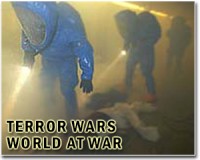 |
Mogadishu, Somalia (UPI) Dec 21, 2010 The reported merger of Somalia's main Islamist faction, the al Qaida-inspired al-Shabaab, with its main rival, Hizbul-e Islam, spells trouble for the beleaguered, Western-backed Transitional Federal Government in Mogadishu. Meantime, a bus bombing Monday in Nairobi, capital of Kenya, which supports the TFG, indicates the emboldened al-Shabaab is spreading its tentacles into East Africa. Three people died in the explosion in central Nairobi and 30 were wounded. The reports al-Shabaab and Hizbul-e Islam have buried the hatchet and combined forces to eliminate the TFG to restore Islamist rule have been attributed to Hizbul-e Islam's chief of operations, Sheik Mohammed Osman Arus. These came as Hizbul-e Islam abandoned positions in Mogadishu and other locations south of the seaside city Sunday, which were then taken over by the jihadists. Hizbul-e Islam had controlled large chunks of territory in southern and central Somalia and these too are presumably now accessible to al-Shabaab. The two Islamist groups have fought intermittently over the last couple of years because of ideological differences. Hizbul-e Islam is more nationalistic than the more radical al-Shabaab, which favors a more international agenda as espoused by Osama bin Laden. Hizbul-e Islam has also opposed the jihadists' use of suicide bombers and summary executions. Its founder, Sheik Hassan Dahir Aweys, who headed an Islamic coalition that ruled Somalia briefly in 2006 before being overthrown by the Ethiopian forces backing the TFG, was highly critical of al-Shabaab's allegiance to bin Laden. The new alliance, if it holds, will give the Islamists a combined strength of around 17,000 fighters, including scores of foreign jihadists who have reportedly reinforced al-Shabaab in recent months. The only things that keep the TFG more or less intact is an 8,000-strong African Union peacekeeping force known as Amisom made up largely of Ugandans and Burundians. In October, al-Shabaab was reported to be bad shape after a six-week Ramadan offensive to smash the TFG and its allies in Mogadishu had failed despite making gains. The group was said to be fracturing between its paramount leader, Ahmad Abdi Godane, and its top field commander, Muktar Robow. They are from different clans and have differed over al-Shabaab's strategic direction and resources. The rift got no further, apparently because Godane has tight control over the group's finances. Clan conflicts have traditionally blighted the Horn of Africa state that has had no effective central government since 1991. The U.S. global security consultancy Stratfor observed Nov. 9 that at about that time talks appeared to be under way between Godane and Robow about a potential merger. The two men "are reportedly interested in creating a new militant organization called the Al-Islamiya Resistance Force, which would hearken back to the name used by al-Shabaab's predecessor (in which Aweys played a large role), al-Ittihad al-Islamiya." How soon this will result in a combined offensive against the TFG isn't clear. But there have been reports that al-Shabaab has been strengthening ties with al-Qaida in Yemen across the Gulf of Aden while it has been extending its reach into East Africa, where al-Qaida has long had a network. Indeed, the leader of that network, Fazul Abdullah Mohammed, indicted for the August 1998 bombing of the U.S. embassies in Kenya and Tanzania, was reported to have been moved to Somalia to bolster al-Shabaab. Several weeks ago, 13 Kenyans suspected of involvement in two deadly bombings in neighboring Uganda, another TFG supporter, July 11 were arrested and transferred to Kampala, Uganda's capital. More than 70 people were killed in the July bombings, the first attack outside Somalia attributed to al-Shabaab and seen as retaliation for Uganda's deployment of troops with Amison. The bus hit in Nairobi was destined for Kampala. It isn't clear whether the bomb was detonated prematurely or by accident but targeting Kampala would make more sense than hitting Nairobi. Ten days earlier, Ugandan police in Kampala found bomb-making material in a package on a bus that had driven from Kenya. "Kampala is a bigger target than Nairobi in al-Shabaab's eyes," Stratfor observed. "This is not only because of its government's support for Amisom, but also because of what the jihadist group would stand to lose by triggering an immense crackdown by the Kenyan government in what is known to be an important al-Shabaab logistics and fundraising hub."
Share This Article With Planet Earth
Related Links The Long War - Doctrine and Application
 Britain expands anti-terror investigation
Britain expands anti-terror investigationLondon (UPI) Dec 21, 2010 British security authorities are searching homes across Britain after the arrest of 12 men suspected of having plotted terrorist attacks. Police searched homes in London, Cardiff, Stoke and Birmingham in operations that are "absolutely necessary," the BBC quoted Scotland Yard Assistant Commissioner John Yates as saying. Police sources told the BBC on Monday that no weapons were found du ... read more |
|
| The content herein, unless otherwise known to be public domain, are Copyright 1995-2010 - SpaceDaily. AFP and UPI Wire Stories are copyright Agence France-Presse and United Press International. ESA Portal Reports are copyright European Space Agency. All NASA sourced material is public domain. Additional copyrights may apply in whole or part to other bona fide parties. Advertising does not imply endorsement,agreement or approval of any opinions, statements or information provided by SpaceDaily on any Web page published or hosted by SpaceDaily. Privacy Statement |